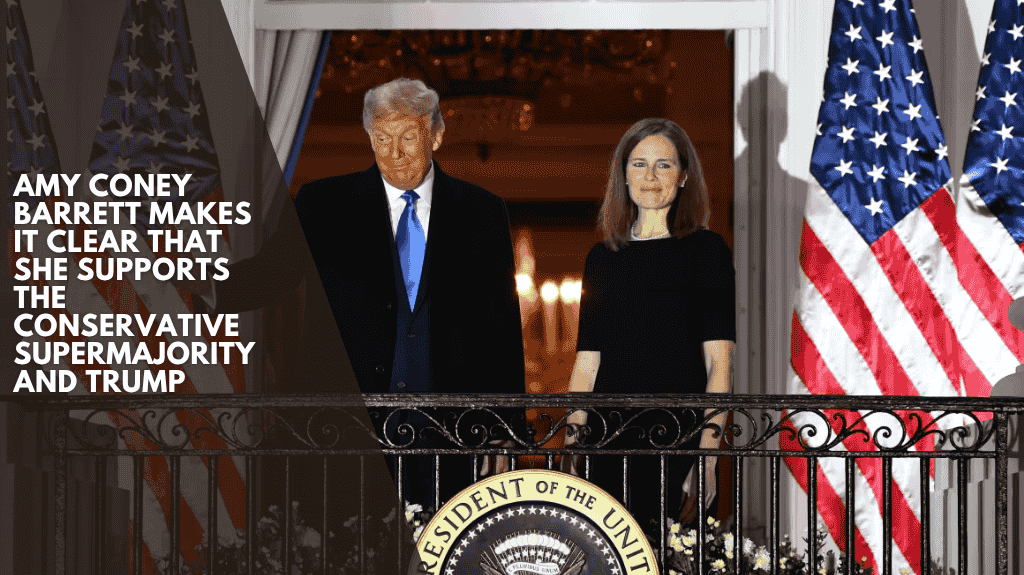For months, Supreme Court Justice Amy Coney Barrett has faced harsh criticism from conservatives for some of her decisions in cases involving President Donald Trump.
This included Trump at times.
However, following Friday’s landmark decision in the birthright citizenship case, the backlash seemed to fade away.
Barrett, whom Trump nominated to the Supreme Court in September 2020, delivered the president a clear and dramatic victory, limiting the ability of lower court judges to stymie his agenda. Trump, who had privately complained about Barrett, was effusive in his praise.
“I want to thank Justice Barrett, who wrote the opinion brilliantly, as well as Chief Justice Roberts and Justices Alito, Gorsuch, Kavanaugh, and Thomas–great people,” Trump said during a celebratory news conference at the White House.
“I just have so much respect for her. “I always have,” Trump stated. “And her decision was brilliantly written today — from all accounts.”
Given the Supreme Court’s 6-3 conservative supermajority, which was established when Barrett succeeded the late liberal icon Justice Ruth Bader Ginsburg, the court’s liberal wing has always faced an uphill battle to avoid dissent.
However, Barrett and Chief Justice John Roberts have occasionally demonstrated a willingness to depart from their more conservative colleagues.
Many conservatives were outraged in March when Barrett voted against Trump’s plan to freeze nearly $2 billion in foreign aid.
Some close to Trump were quick to criticise her decision, with one conservative legal commentator referring to her on a podcast as a “rattled law professor with her head up her a**.” Others used social media to label her as a “DEI hire” and “evil.”
The anger directed at Barrett, a former appeals court judge and law professor, grew after the Supreme Court split 4-4 in a high-profile case questioning whether a Catholic charter school in Oklahoma should receive taxpayer funding.
Barrett recused herself from the case because she had multiple ties to the attorneys representing the school, and the even split upheld an Oklahoma Supreme Court ruling that found the school unconstitutional.
According to CNN, some of Trump’s allies privately told him that Barrett is “weak” and that her rulings do not reflect how she presented herself in an interview before Trump nominated her to the bench.
“There isn’t just one ruling. “He has privately complained about a number of events,” a senior administration official said earlier this month.
It was notable that Barrett, the court’s second-most junior member, was assigned Friday’s major opinion.
Because the senior-most justice on each side of a decision determines who wrote it, Roberts assigned the case to Barrett. Most court watchers assumed Roberts would write the opinion himself or leave it unsigned.
It was by far Barrett’s most high-profile opinion on the court.
It was also a significant victory for the president, as it marked the second time in as many years that the Supreme Court issued a landmark decision in his favour. Last year, the court ruled that Trump was immune from criminal prosecution for federal election interference charges.
Barrett’s opinion does not necessarily imply that Trump will be able to enforce the birthright citizenship order. Lower courts are likely to act quickly to shut it down through alternative means, such as class-action lawsuits.
However, it will make it more difficult for groups opposing future Trump policies to temporarily halt those measures.
“As the number of universal injunctions has increased, so too has the importance of the issue,” Barrett wrote, ignoring the fact that some of that increase has been the result of a president who admittedly sought to push the boundaries of the law in his favour.
“As with most questions of law, the policy pros and cons are beside the point,” Barrett said. “According to our well-established precedent, the equitable relief available in federal courts was that ‘traditionally accorded by courts of equity’ at the time of our founding.
Nothing resembling a universal injunction was available at the founding, or for more than a century afterward.”












